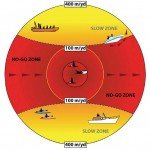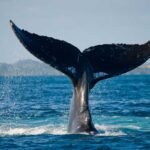Under the Fisheries Act, the Department of Fisheries and Oceans is responsible for the management and protection of marine mammals. The Marine Mammal Regulations specifically prohibit the disturbance of whales.
The DFO has developed guidelines for whale watching in Johnstone Strait, where killer whales are found on a daily basis each summer. It is strongly recommended that vessel operators follow these guidelines for all whale species.
Diving or swimming with whales constitutes a type of approach to whales and falls under these guidelines and regulations. It is illegal to hunt, chase, disperse, drive or herd pods or individual whales.
Be conscious of the effect of your actions on the whales. Be familiar with the distances required and activities that will disturb and interfere with whales. Whale watching activities should not take place in Robson Bight (Michael Bigg) Ecological Reserve.
Whale Watching Guidelines
- Approach whales from the side, not from the front or the rear.
- Approach no closer than 100 metres and shift your motor into neutral or idle.
- Keep noise levels down – no horns, whistles or racing of motors.
- Start your motor only after the whales are more than 100 metres from your vessel.
- Leave the area slowly, gradually accelerating when you are more than 300 metres from the whales.
- Approach and depart slowly, avoiding sudden changes in speed or direction. Do not “leapfrog.”
- Avoid disturbing groups of resting whales.
- Maintain low speeds and constant direction if travelling parallel to whales.
- When whales are travelling close to shore, avoid crowding them near the shore or coming between the whales and the shore.
- Limit the time spent with any group of whales to less than 30 minutes at a time when within 100 to 200 metres of whales.
- If there is more than one vessel at the same observation site, be sure to avoid any boat position that would result in encircling the whales.
- Minimize the time spent and the number of vessels with any one group of whales.
- Limit time, as above, and then move out to allow other vessels access to good viewing positions.
- Coordinate activities by maintaining contact with other vessels, and ensure that all operators are aware of the whale watching guidelines.
Researchers wishing to study whales should check with the Department of Fisheries and Oceans to ensure their proposed study activity is permissible and to determine whether or not they will require a scientific licence.
For research activities that may require entry to Robson Bight (Michael Bigg) Ecological Reserve, researchers should contact B.C. Parks.
Summary convictions for contravention of the Fisheries Act or its regulations carry a fine of up to $100,000 a prison term up to one year, or both. Indictable convictions carry a fine of up to $500,000, prison terms of up to two years, or both. (Fisheries Act s.78)
Reproduced with the permission of Fisheries and Oceans Canada – Marine Wildlife Guidelines for Boaters, Paddlers and Viewers.



